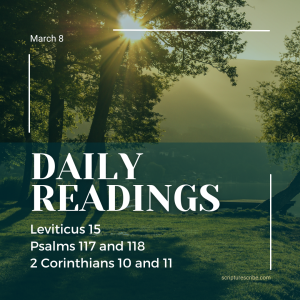
Saturday Mar 08, 2025
Thoughts on the readings for March 8th (Leviticus 15, Psalm 117, 118, 2 Corinthians 10, 11)
Leviticus 15 speaks of issues arising from the flesh. Once again talking about the sin that arises from the conflict between that which is natural to us; and the developing mind which is striving for holiness before our Father (Romans 7 verses 15-8 verse11 consider carefully).
Verses 1-15 talk of running issues in men – verses 1-12 the unclean issue and how it is transferred from one to another; verses 13-15 tell of the period of cleansing and the required offerings.
Verses 16-18 address impurity in physical relationships between man and woman. Verses 19-30 outline running issues in women –
verses 19-24 talks of normal menstruation and the measures to be followed in order to avoid the transferring of impurity and disease;
verses 25-27 abnormal and prolonged menstruation (a woman with this problem was cured by our Lord Jesus Christ; see Mark 5 verses 24-34); verses 28-30 the period of purification and the necessary offerings. Verses 31-33 describe the reason for these laws about issues. Consider the importance the LORD places on these laws (v31).
In Psalm 117 we have the shortest “chapter” in the Bible. In Psalm 118 we have the middle “chapter” of the Scriptures. And in verse 22 of Psalm 118 we have the middle verse of the Bible. It of course centres on our Lord Jesus Christ for he is the central theme of the Scriptures. He is in every chapter; and without him there can be no Bible.
“THE STONE WHICH THE BUILDERS REJECTED HAS BECOME THE CORNERSTONE” (ESV).
Psalm 117 calls upon all nations to extol Yahweh for His everlasting kindness (“chesed”) and truth
(Romans 11 verses 22-23). These will be the hallmarks of the Kingdom of our Lord Jesus Christ.
Psalm 118 continues the theme of the LORD’s enduring stedfast kindness. It is a Messianic Psalm so often quoted in the New Testament. The saints must thank our Sovereign (Yahweh – the LORD) for His covenant love. From verses 5-21 is a pattern of prayer calling from out of the Psalmist’s (Jesus’) distress; alternating with praise and thankfulness for the writer’s deliverance. The trials surrounding our Lord’s crucifixion are described in verses 5-7, verses 10-13 and verses 17-18. The songs of thanksgiving are found in verses 8-9, verses 14-16 and verses 19-21. Note that Messiah says that his enemies would be destroyed in the name of Yahweh (compare Proverbs 18:10). The great work of the Almighty is the focus of the twenty second verse (Isaiah 8 verses 11-16, 28 verses 14-17; 1 Peter 2 verses 4-10). The three synoptic gospel accounts all quote verses 22-23 of Psalm 118, as applying to our Lord’s crucifixion. When our Lord Jesus rode into Jerusalem prior to his death the multitude cried out in the words of verse 25-26.
Verses 27-28 tell us that’ like Isaac (Genesis 22), our Lord was bound – and yet he willingly submitted to the painful and humiliating appointed death. And so Messiah, the now glorious, but previously slain, Saviour praises his Almighty Father in a redeemed and immortalised body. “O give thanks to Yahweh, for He is good; for His stedfast love endures forever!” (Verse 29 ESV).
2 Corinthians 10 tells us that the battle for Christ’s soldiers is in the realm of their mind – a spiritual warfare designed to bring every thought into captivity to Christ. The great Apostle answers his critics who claim that he could cogently argue, but was a weak orator. Paul promises to sort these foes out when he comes to Corinth. Commendation from the tongue of humans is worthless. The Apostle’s approval would come from the Lord Jesus Christ.
In chapter 11 Paul tells them that he loves and guards them from their enemies and would be deceivers. The Apostle says that he is as a true husband to the disciples who he has begotten in Christ: compare Galatians 4:19-20. Paul gives an analogy from Genesis 3 proving that the events of the temptation in Eden really happened. Then from verses 7-15 the Apostle sarcastically compares himself with the false teachers – the judaisers. Finally from the 16th verse to the chapter’s end he composes a catalogue of his sufferings in order to assert his credentials as a committed Apostle of Christ. Paul concludes the list with an account of an act earlier after his conversion of which he was ashamed. His seemingly fleeing from Damascus after having being let down the wall in a basket to escape.
No comments yet. Be the first to say something!